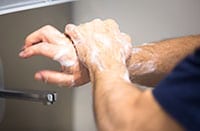Key points
- B virus infection is extremely rare but can be serious and even deadly.
- B virus can spread from infected macaque monkeys to people.
- If you are exposed to a macaque monkey, begin first aid immediately and see a healthcare provider.

What it is
B virus infection is extremely rare. However, it can lead to severe brain damage or death if you do not get treatment immediately.
People typically get infected with B virus if they are bitten or scratched by an infected macaque monkey; or have contact with the monkey's eyes, nose, or mouth.
Signs and symptoms
Symptoms typically start within one month of being exposed to B virus. However, they could appear in as little as 3 to 7 days.
The first indications of B virus infection are typically flu-like symptoms, like fever and chills. Then, you may develop small blisters in the wound or area on your body that had contact with the monkey.
As the disease progresses, the virus spreads to and causes inflammation (swelling) of the brain and spinal cord. Problems with breathing and death can occur one day to three weeks after symptoms appear.
Who is at risk
Most people will not come in contact with monkeys, so their risk of getting infected with B virus is very low.
However, laboratory workers, veterinarians, and people more likely exposed to macaque monkeys have a higher risk of getting B virus infection.
How it spreads
B virus can spread from infected macaque monkeys to people. You can get infected with B virus if you:
- Are bitten or scratched by an infected monkey.
- Get an infected monkey's tissue or fluid on your broken skin or in your eyes, nose, or mouth.
- Have a needle stick by a contaminated syringe.
- Scratch or cut yourself on a contaminated cage or other sharp-edged surface.
- Are exposed to the brain (especially), spinal cord, or skull of an infected monkey.
Prevention
There are no vaccines that can protect you against B virus infection.
If you are in a place with macaque monkeys, stay away from them so that you don't get bitten or scratched. You should not touch or feed monkeys.
People at increased risk should follow appropriate laboratory and animal facility protocols to reduce the spread of B virus.
Treatment and recovery
Get first aid immediately
- Thoroughly wash the wound or area on your body that had contact with the monkey and gently scrub with soap, detergent, or iodine for 15 minutes.
- Run water over the wound or area for 15 to 20 minutes more.
- Tell the healthcare provider that you have been exposed to a macaque monkey that may be infected with B virus.

Medications
If your healthcare provider determines that you need treatment for B virus exposure or infection, you may be given antiviral medications. Timely first aid and treatment for high-risk exposures is crucial to preventing life-threatening disease.
